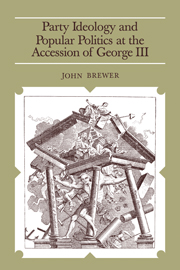Book contents
- Frontmatter
- Contents
- Preface
- A note to the reader
- PART I INTRODUCTION
- PART II THE RECONFIGURATION OF POLITICS
- PART III AN ALTERNATIVE STRUCTURE OF POLITICS
- PART IV FOCUSSED RADICALISM
- PART V TWO POLITICAL NATIONS
- 11 The politicians, the press and the public
- 12 The present discontents; party ideology and public unrest
- PART VI CONCLUSION
- Notes
- Bibliography
- Index
11 - The politicians, the press and the public
Published online by Cambridge University Press: 15 December 2009
- Frontmatter
- Contents
- Preface
- A note to the reader
- PART I INTRODUCTION
- PART II THE RECONFIGURATION OF POLITICS
- PART III AN ALTERNATIVE STRUCTURE OF POLITICS
- PART IV FOCUSSED RADICALISM
- PART V TWO POLITICAL NATIONS
- 11 The politicians, the press and the public
- 12 The present discontents; party ideology and public unrest
- PART VI CONCLUSION
- Notes
- Bibliography
- Index
Summary
I thank you from the bottom of my heart for the kind marks of your confidence communicated by Mr. Jenkinson and. . will exert my utmost efforts to deserve them. I wrote a paper, my Lord, the moment he left me upon the hints he gave me which I hope will appear in the Chronicle this evening. I send your Lordship a paper enclosed which is gone to the Gazetteer. I will pursue these steps daily with the warmest zeal and the most indefatigible diligence.
(John Campbell to Lord Bute, 4 September 1762, Bute Mss.)Up to this point we have examined the press from the point of view of the audience; our perspective has been that of a London club-man or of a provincial coffee-house newsreader. But the press was not merely the vehicle for news; it was an institution that politicians treated with respect, and attempted to manipulate for their own ends. Although most attempts by politicians to control the press were remarkably unsuccessful, it was not for want of trying; besides, they had a great many means, some coercive, some more subtle, by which they could bully and cajole the producers and distributors of the nation's news.
Doubtless the most direct means of control was through taxation. Throughout the century ministers, partly to increase revenue, but primarily as a means of constraint, taxed papers, pamphlets and advertisements. This affected both the format and quantity of newspapers.
- Type
- Chapter
- Information
- Publisher: Cambridge University PressPrint publication year: 1976
- 2
- Cited by



